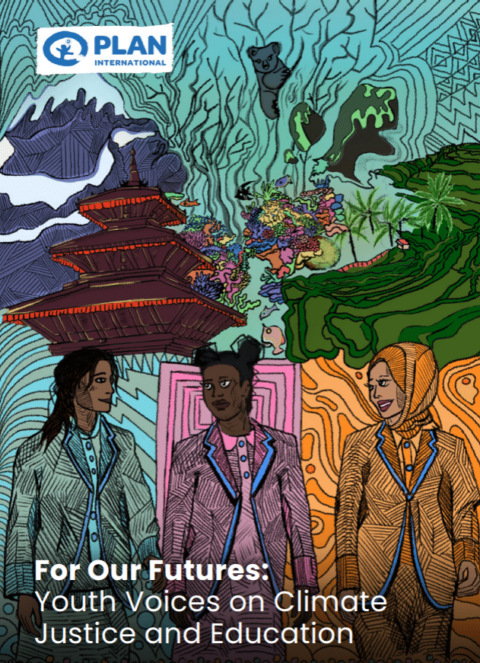Media Centre - Media release - 4 December 2023
“We won’t COP it”: New youth-led climate study to be presented at COP28 finds climate change is having profound impact on girl’s education in Asia Pacific

As the world’s most influential climate experts convene this week in Dubai for COP28, new research by humanitarian organisation Plan International and young people from three countries in the Asia Pacific has revealed the immense impact the climate crisis is having on girls’ and young women’s access to education, with a third of young people surveyed saying their schools had been closed, damaged or destroyed due to climate change related events in the last year, and almost half saying they felt unsafe travelling to and from school due to climate-related disasters.
Two young Australians from Plan International Australia’s Youth Activist Series will this week attend the 2023 United Nations Climate Change Conference – more commonly referred to as COP, and the biggest and most important annual climate-related conference on the planet – to launch new report, For Our Futures: Youth Voices on Climate and Education, and petition for the Albanese Government to make a commitment to the UNFCCC Loss and Damage fund.
The For Our Futures report was co-researched by young people in Plan International’s ‘Youth Activist Series’ across Australia, Nepal and Indonesia
Research by the Malala Fund predicts that by 2025, climate change will be a contributing factor in preventing at least 12.5 million girls from completing their education each year. In Nepal, students are on average losing three months of their education each year due to climate disasters, while in Indonesia in 2021, approximately 100,000 children had their education interrupted by flash floods and landslides. Last year’s devastating floods in Australia in New South Wales and Queensland led to the temporary closure of almost 1,000 schools.
For the For our Futures report, the Youth Activists consulted over 500 people aged between 10-24 (the majority being girls) from Australia, Nepal and Indonesia about the ways in which climate change is impacting their education. The research methodology for the For Our Futures report involved a series of survey questions and a data collection method called photovoice, which allows people to share their experiences and views through photos and video content.
The report found that climate change and climate-induced disasters exacerbate the challenges girls already face in accessing education. Extreme weather events disrupt their daily lives, sometimes making the journey to school dangerous, or causing their schools to close. Household responsibilities, intensified by climate-induced disasters, mean that girls have less time to attend school or complete their studies. Water scarcity can make it difficult for girls to manage their periods safely and with dignity whilst at school.
Key statistics from the For our Futures report:
- 98% of respondents said that they are very concerned or somewhat concerned about how climate change is affecting their school life, or how it will affect them in the future.
- 39% were concerned about finding the job they want in the future because of the way climate change is impacting their education.
- Over 30% had seen their school closed, damaged or destroyed due to climate change related events.
- Almost 50% felt unsafe at school or travelling to and from school due to climate related disasters.
- 62% of respondents had experienced disruptions to their travel to and from school due to climate change. (43% of Australian respondents; 80% of Nepali respondents; 57% of Indonesian respondents.)
- Over 50% of Indonesian respondents were concerned about a decline in their academic performance due to climate events disrupting their education.
- 25% of Nepali respondents had their textbooks or learning materials damaged or destroyed.
- In Australia 69% of respondents said that ‘less power to make decisions about my future’ was one of the top concerns they had about how climate change was impacting their education.
Supported by the Australian federal government’s Step-Up Program, two of Plan International Australia’s Youth Activists, Georgia Shakeshaft and Iremide Ayonrinde, are participating in COP28 this week to present the For Our Futures report, and to make three specific recommendations:
1) They will call on the Australian government to make a commitment at COP28 to contribute to the UNFCCC Loss and Damage fund.
2) They will call for ‘disruption to education’ to be recognised as a specific form of non-economic loss that should be recognised by the UNFCCC Loss and Damage fund.
3) They will call for the establishment of a National Council of Young Women on Climate: to amplify diverse voices, focus on young women with lived experience of the impacts of climate change, and to enable direct communication between young women and decision makers.
Georgia Shakeshaft, a Plan International Australia 2023 Youth Activist, said: “Working on the For Our Futures report, I got to see how badly climate change is affecting my peers – in Australia, and overseas in Indonesia and Nepal. Some of the stories we heard were shocking. We need to listen to the voices of girls and young people, who are experiencing the effects of climate change firsthand. The climate crisis is robbing so many young people around the world of a smooth education. We are being robbed of a future. We are here to say, we won’t cop it.”
One Nepali survey respondent said “Due to floods, the road to school is blocked. Even if you go to school, books and textbooks get wet when you are soaked in water…There is a different kind of weather than it used to be; sunny days in rainy season and no rainfall in rainy season or no water because of rise in temperature. As a result, schools are closed.”
Osin, a Plan International Indonesia 2023 Youth Activists said: “This project provides me with a platform to voice my aspirations as a young Indonesian concerning climate issues. I hope that this endeavour becomes a path towards a broader global youth movement in addressing climate issues in each country.”
Plan Australia’s CEO Susanne Legena said, ‘The climate crisis is not gender neutral. It is impacting girls first and worst, particularly in the poorest countries which are the least responsible for climate change. As the leading global charity for girls’ equality, Plan International recognises that the climate crisis is an intergenerational and gender injustice.”
Ms Legena said that the report also highlights the resilience, agency and hope young people hold when it comes to the climate crisis. “Girls around the world are taking collective action to advance climate justice, and we are working with these girls and their communities to reduce climate risks, adapt to climate change, strengthen resilience, promote girls’ leadership and increase their political empowerment. These incredible young change-makers want to learn more about how we combat the climate crisis and boost green job skills and they are demanding their education curriculums take this into account. Their activism and their agency gives them hope for their futures – but wealthy countries such as Australia and big polluters need to take responsibility and step up to take meaningful action by committing to the loss and damage fund,” she said.
[ENDS]
Notes to editors:
The For Our Futures report is a key initiative in Plan’s climate change work. Plan International has also worked to support the Climate Change Amendment (Duty of Care and Intergenerational Climate Equity) Bill alongside other key female youth activists. Plan International sent representatives to Asia Pacific Climate Week in November.
About Plan International’s Youth Activist Series
Plan International Australia’s Youth Activist Series is a 12-month program for young people who are passionate about fighting for gender justice. They receive training in advocacy and campaigning, stakeholder and government relations, media and communications and research, to then go out into the world and tackle inequality head on.
About the Climate Step-Up Program
The Australian Government’s International Climate Step-Up Program aims to increase international engagement on climate change and energy transformation issues. It was announced as part of the Australian Government’s commitment to renew Australia’s international climate leadership, support global efforts to decarbonise, and secure the nation’s future as a renewable energy superpower. It will run over 6 years from 2023-29. Plan International Australia’s two Youth Activists were funded to attend COP28 through a grant opportunity as part of Australia’s International Climate Step-Up program. The objective of the grant opportunity is to support the travel of individuals from underrepresented groups including First Nations Australians and youth to attend and contribute to Australia’s inclusive climate engagement at COP28.
About the artwork and artists for the For Our Futures report
Artwork by Plan International Australia Youth Activist Niranjana (@loveon35mm), and Anton (@artxanton)
Media contacts


